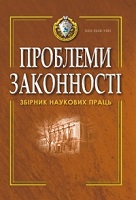Конфіскація російських активів для відновлення України: правові проблеми реалізації
Confiscation of Russian Assets for the Restoration of Ukraine: Legal Problems of Implementation
Author(s): Ivan Yakoviyk, Anna TurenkoSubject(s): National Economy, International Law, EU-Accession / EU-DEvelopment, Russian Aggression against Ukraine
Published by: Національний юридичний університет імені Ярослава Мудрого
Keywords: economic security; national interests; international law; sanctions; blocking; confiscation; assets; foreign sovereign immunity; aggression; Ukraine; USA; European integration;
Summary/Abstract: The article is devoted to the problem of creating and applying legal mechanisms for blocking and confiscating Russian assets in order to use them for the restoration of Ukraine, which suffered from Russian aggression. The subject matter of the study is the analysis of international legal norms, national law, international and national judicial practice. The purpose of the article is to study and assess the legal possibilities of compensation for damages caused by Russian aggression against Ukraine. The research methodology involves an analysis of the rules of public international law, international humanitarian law and international criminal law, which the states that have imposed anti-Russian sanctions may rely on when seeking mechanisms for confiscation of Russian assets under sanctions in order to satisfy Ukraine's claims for reparations against Russia. Achieving the objectives of the study also involves an analysis of international and national law on the issue of foreign sovereign immunity in the context of the possibility of confiscation of assets of the Russian Central Bank. The author examines the issue of freezing (blocking) of assets of persons under the jurisdiction of the countries initiating anti-Russian sanctions. The author proves that these actions are a widely used policy tool of the United States, the European Union and other states which seek to punish the government of a particular country in this way. As part of the blockade, assets may be held until the country that violates international law changes its policy. In the case of Russian aggression, the United States and other countries that have frozen Russian assets may refuse to return them as a countermeasure until Moscow not only stops its aggression against Ukraine but also pays reparations to Ukraine. It is established that the general trend (albeit with some exceptions) of the last two decades has been to strengthen the immunity from enforcement of foreign central banks' property, which is in line with the approach adopted in the UN Convention on Jurisdictional Immunities of States and Their Property. The author considers the possibility of creating legal mechanisms for the confiscation of Russian assets frozen by Western countries and a number of other states, both at the international and national levels. Based on the study, the author formulates conclusions regarding the existence of legal (both at the level of international and national law) and political (primarily, the fear of retaliatory sanctions, and most importantly, the possibility of withdrawal of assets of foreign investors and central banks of individual states from the United States) obstacles to the confiscation of Russian assets.
Journal: Проблеми законності
- Issue Year: 2023
- Issue No: 161
- Page Range: 6-29
- Page Count: 24
- Language: Ukrainian

